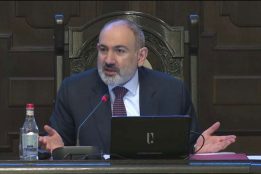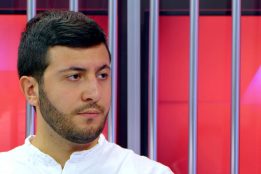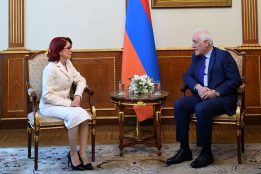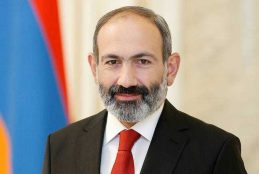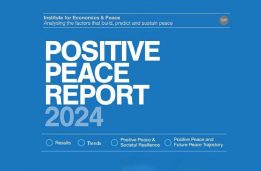
Şaban Kardaş from German Marshall Fund of the United States touched upon the developments in Syria and the role of U.S. and Turkey. Find the article below.
Syrian anti-government groups reached a U.S.-backed deal in Doha, responding to the Western pressures to present a unified front and form a new leadership, representative of various groups fighting the regime. Long a supporter of the opposition, Turkey welcomed this development and urged the international powers to back it fully. It has been no secret that Turkey was far from satisfied with the U.S. position on Syria, but without clear U.S. support, it could neither achieve the diplomatic isolation of the regime nor could it channel decisive support to the opposition on the ground.
Turkish government has understandably wanted to see a more resolute international support to change the calculations in the opposition’s favor, for the regime’s persistence has already raised questions about its regime change policy, and it wants to see the acceleration of that process. Whether the Doha agreement can dramatically affect the situation remains to be seen. Its effectiveness will depend on a host of factors, including the ability of the Syrian groups to uphold it or the contours of the U.S. policy in Syria in Obama’s new term. If the accord could be put into practice, however, it could present a good opportunity to streamline the Turkey-U.S. strategic cooperation.
An interesting catalyst in the process leading to Doha agreement was U.S. Secretary of State Hillary Clinton’s intervention. In late October, Clinton harshly criticized the Syrian National Council (SNC), pointed to the radical elements in its ranks, and urged a new leadership structure that is more representative and that commands greater support inside and outside the country.
Her remarks triggered interesting reactions in Turkey. Those reactions may also give clues about the evolution of the dynamics between Turkey, the United States, and the Syrian opposition. Those clues are important to ponder in order to understand the Turkish-U.S. cooperation in Syria in the new era. While the U.S. involvement in the Syrian uprising and its relationship to Turkey’s Syria policy has been a subject of intense debate in Turkey, its subtleties have not been easily understood in Washington.
Turkey and the Syrian National Council
Hosting the core elements that went on to form the SNC since the beginning of the uprising, Turkey has done its utmost to render it the most representative body of the opposition. Even during the early days of the protests in Syria in 2011, when it was still hoping to find a negotiated settlement through its access to President Bashar al-Assad, Turkey let the Syrian opposition meet on its territory. As it abandoned Assad and called for regime change later that year, Turkey facilitated the unification of those groups under the SNC and the closer ties between the civilian opposition in exile and the military resistance in Syria through its shelter of the Free Syrian Army. Turkey also called on all opposition groups to unite under the SNC, so that they could gain greater legitimacy in the eyes of the international community. As the countries supporting the opposition gathered for the Friends of Syria meeting in Tunis in early 2012, the question of who will represent the fragmented opposition groups gained urgency. Turkey managed to have a seat for the SNC at the next Friends of Syria meeting in Istanbul but the only accomplishment was in having the participants describe it as a legitimate representative of the Syrian people.
Despite its limited success in having the SNC sanctioned as the sole representative, Turkey kept the SNC at the center of its Syria policy. Meanwhile, acknowledging the SNC’s limitations, Turkey continued its efforts to expand its base, through closer ties with Syrian Kurds and inclusion of non-Muslim groups. The SNC’s moves in that direction, such as the election of a Kurd as its second president, however, fell short of allaying criticisms, and it continued to be viewed as closely affiliated with the Muslim Brotherhood, while it also suffered from lack of strong leadership. Turkey’s unwavering support for it, correspondingly, was attributed to the alleged Islamism of its government, and its ties to the Brotherhood.
In the regional quarters, the Turkey-SNC relationship, thus, came under criticism. Turkey’s close affinity with the SNC was found to be divisive of the opposition. Instead, some said Turkey should have based its Syria policy on a more representative platform. Though such criticisms might have had some merit, they were also reflective of the fact that most Gulf actors, along with the United States, were not particularly happy with the rise of the Brotherhood as the leading player in Syria after its success in Egypt, and they groomed other candidates for future leadership.
Turkey’s support for the SNC also was a major argument used by the domestic critics of the government’s Syria policy. Blinded by its sympathy for the Brotherhood, the argument goes, the government got Turkey bogged down in the Syrian quagmire and increasingly isolated itself in the region and the international community. Not only did it invite a confrontation with Moscow and Tehran, the main allies of Damascus, but also, and perhaps more importantly, the government was even left alone by its allies. This alleged alienation of Turkey in the Syrian conflict, where it arguably had to shoulder the responsibility of confronting the Syrian regime, was, for the critics, due to the sectarian motivations driving the government’s policy.
Therefore, in the last couple of months, the major foreign policy debate within Turkey concerned the revision of the Middle East policy. Critics called for a complete revamp of Syria policy, and an opening up of channels to not only the opposition groups other than the SNC but also to the regime. What the critics often miss is that Turkey’s Syria policy requires a longer and perhaps painful process, while the critics themselves are too tempted to capitalize on short-term developments to criticize the policy, which was reflected once again in their reaction to Clinton’s remarks.
Reactions to Clinton’s Remarks: A Glass Half Full
Clinton remarks were like a glass half full, and everyone interpreted them as best suited their agendas. Against the background of the ongoing debate, the government’s critics wholeheartedly embraced Clinton’s remarks. For them, her words simply put the last nail in the coffin of the government’s Middle East policy. With the U.S. determination to exclude the SNC from the new structures representing the opposition, Turkey would be completely sidelined from the Syrian crisis. Some also referred to a rivalry between Turkey and Qatar, as the meeting was to be held in Doha. In a manner that supported such arguments, news reports on Clinton’s remarks also presented Doha meeting as a U.S. move to finish off the SNC.
What those rather simplistic accounts missed was that though Clinton’s call for the overhaul of the opposition had, in its essence, some merit, her remarks were factually problematic. Neither was the SNC was comprised solely of Islamists, nor did it lack support among the groups fighting on the ground. The SNC commands a certain constituency in Syria, which, as it turned out in Doha, cannot be ignored. In that regards, Turkey’s backing of the SNC has been based on some objective assesment of the Syrian situation. Therefore, Turkey sustains its support to the SNC, through which it hopes to maintain its leverage in the mechanisms that will shape Syria’s future.
The analysts supportive of the government’s position had a cold reaction to Clinton’s remarks. They maintained that, by painting the SNC in Islamist and extremist terms, the United States was seeking to delegitimize it and draw the attention away from the gains it had scored on the ground in recent months. In this light, for instance, the wide circulation of video footage showing the execution of imprisoned Syrian soldiers by the opposition fighters was part of a well designed public relations campaign to prepare the ground for undercutting the SNC’s rising influence. They maintained that by pointing out to the opposition’s disorganized nature, the United States was drawing the attention away from its own lack of action. Clinton’s remarks also were big news in Islamist circles. So far, the Syrian case has led to the divisions among Turkish Islamists. The Western backing of the opposition and Iran’s alliance with the regime have led some Islamists to develop a skeptical attitude on the Syrian uprising, and they believe there is external manipulation behind the events. Other Islamist groups see Syria as one of kıyam (uprising against an unjust ruler) and find it undoubtedly Islamic in character, hence worthy of assistance. While their support for the uprising stems directly from ideological affinity, the Western/U.S. ties with the Syrian opposition groups troubles them. They come under criticism from the first group that they are acting alongside the Western agenda against the “resistance front” in the Middle East.
Simply put, the Islamist groups supportive of the uprising were angered by Clinton’s remarks, and viewed it as an U.S. attempt to hijack the Syrian revolution. For them, alarmed by the success of the Islamists, the United States was seeking to install a new generation of leaders so that it could exert more influence on the course of the Syrian uprising and control the opposition directly.Such reactions are important, because any new opposition structure that will come out of a U.S.-backed process may suffer from a legitimacy crisis among Islamist circles not only in Turkey but also in the wider region if it is seen as completely allied with the U.S. interests and fails to differentiate between homegrown conservative opposition forces and extremist elements. To the extent that the sole U.S. interest in Syria becomes limiting the influence of extremist groups, it might eventually clash with the shared Turkish and U.S. objective of building a unified opposition block, and undermine the support base of Turkish government at home.
Turkey, Syrian Opposition, and the United States after Doha
There was a positive side to Clinton’s remarks, which it seems Turkish Foreign Minister Ahmet Davutoğlu preferred to see. The gist of Clinton’s message, which was not fully explored in the Turkish debate, was that if the opposition pulls itself together, it will be worthy of assistance. Turkey saw the call, joined the Doha process, and acted alongside other actors. Unlike what was suggested by its critics, the government’s Syria policy still clings to the same pillars, though it also acts in a flexible manner to adjust its position to the new developments.
With its active involvement during the talks leading to the formation of the Syrian National Coalition for Opposition and Revolutionary Forces, the Turkish government showed that it would not accept being sidelined. For its part, the SNC also demonstrated a similar flexibility and agreed to participate in the newly formed opposition block. Though Turkey may not be the sole leading force behind the opposition, it remains an influential powerbroker, and the new umbrella organization is in line with its efforts to unite the opposition. Also, the new block’s determination to reject dialogue with Assad adds further credence to Turkey’s policy of regime change, for it has repeatedly ruled out a future with the Baath Party or Assad.
The only remaining element for closing the circle on a successful end to Turkey’s policy on Syria is the streamlining of the regional and international support behind the opposition. If indeed Clinton’s remarks were statement of the U.S. policy for a new era, it will put the United States under pressure to be more forthcoming. With his positive reaction to the Doha accord, Davutoğlu sought to accomplish exactly that. Alluding to the divided nature of the opposition that had been used often to justify the Western/U.S. ambivalence in extending full support to the opposition, Davutoğlu called on the Friends of Syria to be forthcoming in their assistance. What remains to be seen is if the United States will deliver its end of the deal, provided that the opposition groups uphold the Doha accord. Only then will Turkey feel more comfortable that the region is “charting a course toward the end of Assad’s bloody rule and the start of the peaceful, just, democratic future that all the people of Syria deserve.”
1

















